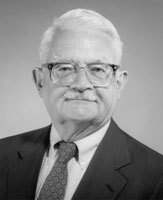Berkeleyan
Obituary: William J. Bouwsma
![]()
10 March 2004
| |  |
William Bouwsma, professor emeritus of history and preeminent scholar of early modern European culture, died on March 2. He was 80.
A Berkeley resident, Bouwsma died following complications from an aneurysm. A funeral service was held last Saturday.
Bouswma taught at Berkeley from 1957 until his retirement in 1991. His research focused on the history of European culture in the early modern period, from the 14th to the 17th century.
“Since the early 1960s, Bouwsma’s writings became widely influential among scholars and graduate students in the general area of Renaissance studies,” said history professor Thomas Brady. “He explored the relationships between humanist cultural values and public life in the Renaissance, and in his later works, meditated on why the ideals of that age seem to be growing less attractive to our own.”
Bouwsma’s first book, published in 1957, was a study of Guillaume Postel, a French intellectual of the late 16th century. In 1968, he published Venice and the Defense of Republican Liberty: Renaissance Values in the Age of the Counter-Reformation. His initial interest in the career of Venetian cleric Paolo Sarpi expanded into an analysis of Venetian politics and their social and cultural context, and beyond that to a consideration of the confrontation between a Renaissance republic and the Counter-Reformation papacy.
In 1988, Bouwsma published an intellectual biography of John Calvin, a significant contribution to the scholarship about that major Reformation figure. In 1990, the University of California Press published a collection of Bouwsma’s essays, A Usable Past: Essays in European Cultural History.
His last book, The Waning of the Renaissance 1550-1640, was published in 2000. This work surveys the history of the Renaissance culture, from its heady origins in the 14th century through a period of maturity followed by a reaction and rejection of its basic values. A Publishers Weekly review said that “Bouwsma produces a masterful portrait of an era ... it will be increasingly difficult to teach or discuss the 16th century without it.”
Retired history professor Henry May said of his longtime friend and colleague: “His historical thought was powerful, complex, and profound.”
Bouswma was born in Ann Arbor, Mich., and raised in Nebraska. He received his bachelor’s degree from Harvard University in 1943 and, after three years in the U.S. Air Force, returned to Harvard and earned his doctorate in history in 1950.
Bouwsma taught at the University of Illinois for seven years before coming to Berkeley in 1957. Except for two years teaching at Harvard, he would remain at Berkeley until his retirement, serving twice as chair of the history department and as campus’s vice chancellor for academic affairs, 1967-69.
During his career he was president of the American Historical Association; fellow of the American Academy of Arts and Sciences; and fellow of the American Philosophical Society, among many honor.He was also awarded the Berkeley Citation, at his retirement, one of the campus’s highest honors.
Bouwsma is survived by his wife of 60 years, Beverly, as well as by four children and six grandchildren.

